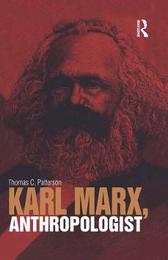
|
Karl Marx, Anthropologist
Hardback
Main Details
| Title |
Karl Marx, Anthropologist
|
| Authors and Contributors |
By (author) Thomas C. Patterson
|
| Physical Properties |
| Format:Hardback | | Pages:240 | | Dimensions(mm): Height 234,Width 156 |
|
| Category/Genre | Social and political philosophy |
|---|
| ISBN/Barcode |
9781845205096
|
| Classifications | Dewey:335.4092 |
|---|
| Audience | | Tertiary Education (US: College) | |
|---|
|
Publishing Details |
| Publisher |
Bloomsbury Publishing PLC
|
| Imprint |
Berg Publishers
|
| Publication Date |
1 April 2009 |
| Publication Country |
United Kingdom
|
Description
After being widely rejected in the late 20th century the work of Karl Marx is now being reassessed by many theorists and activists. Karl Marx, Anthropologist explores how this most influential of modern thinkers is still highly relevant for Anthropology today. Marx was profoundly influenced by critical Enlightenment thought. He believed that humans were social individuals that simultaneously satisfied and forged their needs in the contexts of historically particular social relations and created cultures. Marx continually refined the empirical, philosophical, and practical dimensions of his anthropology throughout his lifetime.Assessing key concepts, from the differences between class-based and classless societies to the roles of exploitation, alienation and domination in the making of social individuals, Karl Marx, Anthropologist is an essential guide to Marx's anthropological thought for the 21st century.
Author Biography
Tom Patterson is Distinguished Professor and Chair of Anthropology at the University of California at Riverside. He is author of many publications including Marx's Ghost: Conversations with Archaeologists (2003) and A Social History of Anthropology in the United States (2001).
Reviews'This is a timely reminder of both the Enlightenment background and holistic nature of Marx' anthropology, which concerns not merely understanding classical industrial capitalism but also such diverse issues as the modern age of empire, human origins and non-Western political systems'. Dr Nikolai Ssorin-Chaikov, University of Cambridge
|